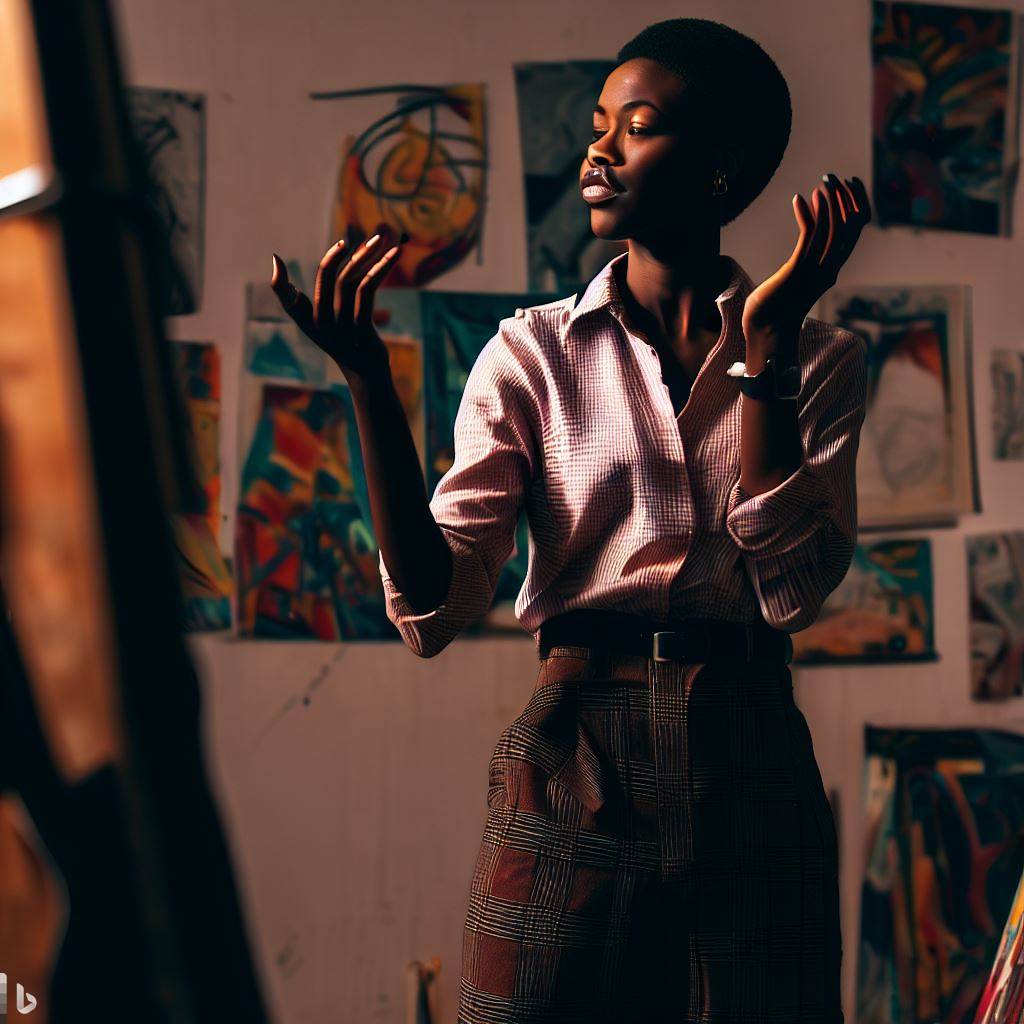Introduction
Art management involves the administration and supervision of art activities and resources.
Art management is crucial in Nigeria as it plays a vital role in promoting cultural heritage and economic growth.
Brief explanation of art management:
- Art management involves organizing, promoting, and sustaining art and cultural endeavors.
- It encompasses artist representation, event planning, marketing, and financial management.
- Art managers bridge the gap between artists and their audience, ensuring smooth operations.
Importance of art management in Nigeria
- Cultural Preservation: Art management preserves Nigeria’s rich cultural heritage through exhibitions and events.
- Artist Support: It provides artists with essential support, including financial management and marketing.
- Exposure: Art managers promote Nigerian artists on national and international platforms, expanding their reach.
- Economic Growth: The art industry contributes significantly to Nigeria’s economy and job creation.
- Community Engagement: Art events foster cultural exchange and community involvement.
- Professionalism: Art management ensures ethical practices, fair compensation, and legal compliance.
- Global Recognition: Proper management helps Nigerian art gain global recognition and respect.
- Sustainability: Art managers strategize for long-term success and sustainability in the art scene.
- Networking: They build valuable connections within the industry, opening doors for artists.
- Innovation: Art managers encourage innovation and experimentation in art, pushing boundaries.
In general, art management is a linchpin for the growth, preservation, and recognition of Nigeria’s vibrant art scene.
It brings professionalism, exposure, and economic benefits while ensuring the sustainability of artistic endeavors.
The Nigerian Art Industry
The Nigerian art industry is a vibrant and diverse sector that encompasses various forms of artistic expression and creativity.
It includes visual arts, performing arts, literature, music, and film.
Nigeria has a rich cultural heritage with a long history of artistic excellence.
The country is home to numerous talented artists who have produced exceptional works that have gained recognition both locally and internationally.
The Nigerian art industry is known for its diversity and innovation.
Artists draw inspiration from traditional Nigerian art forms as well as contemporary global influences.
The industry offers a platform for artists to showcase their work and express their ideas and identities.
Growth and potential of the sector
The Nigerian art industry has experienced significant growth and holds tremendous potential for further development.
It has become an important contributor to the country’s economy and cultural identity.
Over the years, there has been a growing demand for Nigerian art both domestically and internationally.
Nigerian artists have gained recognition on the global stage, attracting collectors, galleries, and art enthusiasts from around the world.
The rise of social media and online platforms has also played a significant role in the growth of the Nigerian art industry.
Artists can now showcase and sell their artwork to a wider audience, breaking down geographical barriers and reaching potential buyers from different parts of the world.
Challenges faced by the Nigerian art industry
Despite its growth and potential, the Nigerian art industry also faces numerous challenges that hinder its progress and sustainability.
One of the main challenges is the lack of infrastructure and institutional support.
The absence of well-equipped art galleries, museums, and educational institutions limits the exposure and accessibility of Nigerian art to the public.
Another challenge is the issue of piracy and copyright infringement.
The art industry suffers from a lack of effective copyright protection and enforcement, making it difficult for artists to protect their intellectual property and earn a fair income from their work.
Furthermore, the Nigerian art market faces the challenge of market saturation and exploitation.
Rising art prices attract speculators and opportunists, leading to inflated prices and fake artworks circulating in the market.
This undermines the credibility and value of Nigerian art.
Lastly, the lack of funding and financial support for artists hinders their creative potential.
Many aspiring artists struggle to access resources and opportunities due to limited financial backing, preventing them from fully realising their artistic visions.
The Nigerian art industry is a vibrant and diverse sector with immense growth potential.
However, it also faces significant challenges that need to be addressed for its sustainable development.
Developing infrastructure, protecting copyrights, regulating markets, and enhancing financial support are vital for Nigerian art industry’s growth.
Read:The Role of PR in Nigeria’s Corporate World
Challenges of Art Management in Nigeria
Art management in Nigeria faces numerous challenges that hinder its growth and development.
These challenges must be addressed in order to create a thriving and sustainable arts sector in the country.
Lack of infrastructure and resources
Nigeria lacks adequate infrastructure and resources for effective art management.
This includes a lack of well-equipped exhibition spaces, storage facilities, and art studios.
Without these essential resources, artists and art managers struggle to organise exhibitions, store and manage artworks, and provide adequate facilities for artists to work.
This lack of infrastructure hampers the growth and development of the arts sector in Nigeria.
Limited funding and financial constraints
One of the major challenges faced by art managers in Nigeria is limited funding and financial constraints.
The arts sector receives little financial support from the government and private institutions, making it difficult for art managers to finance projects and initiatives.
This lack of funding restricts the ability to promote and market Nigerian art locally and internationally, hindering the growth and recognition of Nigerian artists.
Limited professional training and development opportunities
Nigeria’s art management field suffers from a lack of professional training and development opportunities.
The absence of specialised courses and programs in art management leaves art managers without the necessary skills and knowledge to effectively manage and promote art.
This leads to a lack of professionalism and expertise in the sector, hindering the growth and potential success of Nigerian art on a global scale.
Inadequate legal and regulatory framework
The absence of a robust legal and regulatory framework is another challenge for art management in Nigeria.
The lack of clear legislation and policies regarding the protection of intellectual property rights, art sales, and taxation creates uncertainty and insecurity within the arts sector.
This hampers the growth and development of the industry and discourages both local and international investment in Nigerian art.
Limited international exposure and market access
Nigerian art suffers from limited international exposure and market access.
The absence of effective marketing and promotion strategies, coupled with inadequate international art networks, restricts the visibility and recognition of Nigerian artists on the global stage.
Moreover, Nigerian artists’ career growth and art sector development suffer due to restricted international fair and exhibition access.
In general , art management in Nigeria faces significant challenges that impede its growth and potential.
Insufficient infrastructure, resources, funding, training, legal framework, and global exposure collectively challenge Nigerian art managers.
By addressing these challenges, Nigeria can create a thriving and sustainable arts sector that contributes to the country’s cultural and economic development.
Read:How to Begin a Makeup Artistry Career in Nigeria: A Guide
Gain More Insights: Costume Designing for Nigeria’s Music Video Industry
Uncover the Details: Ethics and Professionalism for Artists’ Agents in Nigeria
Solutions and Strategies
The challenges faced by art management in Nigeria are significant, but they can be overcome through various solutions and strategies.
This section explores some key approaches that can help address these challenges and promote the growth and development of the art industry in the country.
Strengthening infrastructure and resources
Improving the infrastructure and resources available for art management is crucial for its success.
This includes establishing well-equipped art galleries, museums, and cultural centres across the country.
Adequate facilities and resources will provide artists with suitable spaces to showcase their work and attract both local and international audiences.
Increasing funding and financial support
Lack of funding is one of the major challenges faced by artists and art organisations in Nigeria.
To address this issue, it is necessary to increase funding opportunities and financial support for the art industry.
This can be done through government initiatives, private sponsorship’s, and partnerships with international art organisations.
Adequate funding will allow artists to create and exhibit their work without financial constraints.
Enhancing professional training and development programs
Professional training and development programs play a critical role in nurturing and expanding the skills of artists and art managers.
These programs should focus on areas such as art marketing, entrepreneurship, project management, and art curation.
By enhancing the professional capabilities of individuals involved in art management, the overall quality and sustainability of the art industry can be improved.
Establishing a favorable legal and regulatory framework
A favorable legal and regulatory framework is essential for the growth of the art industry.
This framework should protect the intellectual property rights of artists, provide a supportive environment for art businesses, and facilitate international collaborations.
Creating transparent and efficient processes for copyright protection, licensing, and art sales will encourage artists to invest in their creative endeavors.
Expanding international exposure and market access
To overcome the challenges of limited local market and weak international presence, Nigerian art management needs to expand international exposure and market access.
This can be achieved through participation in international art fairs, exhibitions, and collaborations with foreign art institutions.
By connecting with the global art community, Nigerian artists can gain recognition, attract international collectors, and create opportunities for cultural exchange.
The challenges faced by art management in Nigeria can be effectively addressed through a combination of solutions and strategies.
To foster the Nigerian art industry, strengthen infrastructure, boost funding, improve training, establish favourable regulations, and expand global exposure.
Read:Guide to PR Certifications Available in Nigeria

Success Stories and Initiatives in Art Management
Successful Art Management Initiatives in Nigeria
- The Lagos Biennial, an international contemporary art exhibition, has garnered recognition and attracted global participation.
- The African Artists’ Foundation provides platforms for African artists to showcase their talent and gain international exposure.
- Art X Lagos, a premier international art fair, celebrates and promotes contemporary African art to a global audience.
Notable artists and art organizations making a difference
- Yinka Shonibare, a renowned Nigerian-British artist, challenges cultural stereotypes through his thought-provoking work.
- The Nlele Institute fosters artistic innovation and collaboration through its artist residency programs and community engagement.
- The Rele Gallery supports emerging artists and curates exhibitions that explore social, political, and cultural themes.
Showcasing case studies of management strategies that have worked
- The Nike Art Gallery, managed by Chief Nike Davies-Okundaye, successfully preserves and promotes traditional Nigerian art.
- The Centre for Contemporary Art, Lagos, curates exhibitions, workshops, and educational programs to bridge the gap between artists and the public.
- The ICAF (International Cultural Arts Festival) attracts international collaborations, showcasing Nigerian art on a global stage.
These success stories and initiatives highlight the progress made in art management in Nigeria.
They signify the growing recognition and appreciation for Nigerian artists and their contributions to the global art scene.
The efforts of organizations, artists, and curators have helped elevate the visibility of Nigerian art and showcase its cultural richness.
Read:The Challenges and Triumphs of Make-up Artists in Nigeria
Uncover the Details: Nigeria’s Top Music Festivals and the Role of DJs
Conclusion
The challenges faced by art management in Nigeria
Art management in Nigeria faces numerous challenges, including lack of funding, limited infrastructure, and poor government support.
The importance of overcoming these challenges
Overcoming these challenges is crucial for the growth and development of the Nigerian art industry, as it has immense cultural and economic potential.
Encourage collaboration and support for the Nigerian art industry
It is essential for stakeholders, including artists, collectors, and the government, to collaborate and provide support to promote and sustain the Nigerian art industry.
The challenges faced by art management in Nigeria are significant.
However, it is crucial to overcome these obstacles to harness the potential of the Nigerian art industry.
By emphasising the importance of supporting and collaborating within the industry, we can create a thriving arts sector that contributes to cultural enrichment and economic growth.
Let us join forces to uplift and celebrate the diverse artistic talents in Nigeria.




